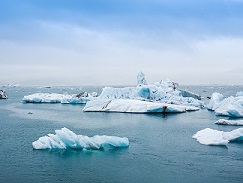
NOTE: This piece is reprinted from its appearance as a Letter to the Editor of the Frederick News Post , with permission from the authors.
As current and former students of the Frederick County Public Schools system, we’re writing to outline the climate-focused curriculum we experienced during our education in the county — and to encourage broadening classroom and field experiences with environmental science across all grade levels.
Climate change education is an extremely important and relevant topic for students to learn about, especially for upcoming generations, as the severity of its impacts will only increase. We are the generation that will implement and pay for necessary practices to reduce the county’s impacts from extreme heat, major storms and accompanying flooding and extended droughts. Hence, understanding FCPS educational opportunities on climate change offered to students in the past decade not only indicates the historical local commitment to these increasing public, private and environmental threats but possibilities for expanding our understanding and abilities to minimize impacts in the coming decades.

In the past, the primary issue with environmental education, and specifically climate change, in Frederick County was the lack thereof. While biology and other natural science courses briefly covered climate change, there is no mandatory course dedicated exclusively to environmental education. It was not a holistic education about the sciences without comprehensive education on natural systems and processes, and how humans have altered them. Without required courses dedicated to these subjects, there is little chance that Frederick County students have received the needed information to understand the natural environment and the dangers of climate change.
In our experience, climate systems were included in science units in natural science courses in middle school. In high school, there was no specific requirement for environmental studies. It had to be sought out by the individual student based on personal interest or to fulfill an elective credit. With the increasing emergency of climate change, it’s critical to educate our young on these matters. We need to create a climate-conscious generation, aware of the public and environmental issues at hand to prepare us to continue to improve conditions that surround us. This will enable Frederick to have knowledgeable students — future adults — working together to make our community more sustainable.
In addition to increasing awareness and environmental education within FCPS, it is important to understand the significance of small actions. We were often educated about the importance of “reduce, reuse and recycle.” We remember recycling being very important in elementary school. In our classrooms from grades K-5, we had one bin for trash and one bin for recycling. Teachers talked about which items to recycle and which to throw in the trash. The expectations were rather clear.
Throughout our years of middle school and high school, the concept of recycling became less important. Bins were no longer clearly labeled, and from a student’s perspective, it was difficult to tell which bins were for trash or recycling. Eventually, students and staff alike began throwing trash in the recycling bins. Additionally, the burden was put on the custodial staff, rather than the administration, teachers or students. Instead of combatting the lack of clarity and education, schools chose the easier option and allowed recycling to move to the back burner or be eliminated entirely. Climate and environmental activism does not only rely on educating our children, but demonstrating the importance of small contributions, like recycling. But that knowledge is not enough, we require major action. If our experience with recycling is any indicator of FCPS’ commitment to climate change education, we are in trouble.
FCPS needs to show that they will fulfill these changes. Leading by example, to not only recycle but move foods from our waste stream, seems logical and needed to complement increases in class experiences and exposures to the new climate that surrounds us. We would like to see required courses on climate change and environmental systems to ensure our youth are properly educated. We all appreciated our time with FCPS, but must insist on environmental curriculum improvements for the good of our community and future generations.
Virginia Borda is a 2019 graduate of Brunswick High School who is now at the University of Maryland majoring in environmental science and policy. Myrah Contento also graduated from Brunswick High School in 2019 and was raised in Jefferson. She is at the Ohio State University, majoring in environment, economy, development and sustainability. Callie Miller is a rising senior at Tuscarora High School. Aleksandra Zvaners is a rising senior at Urbana High School.